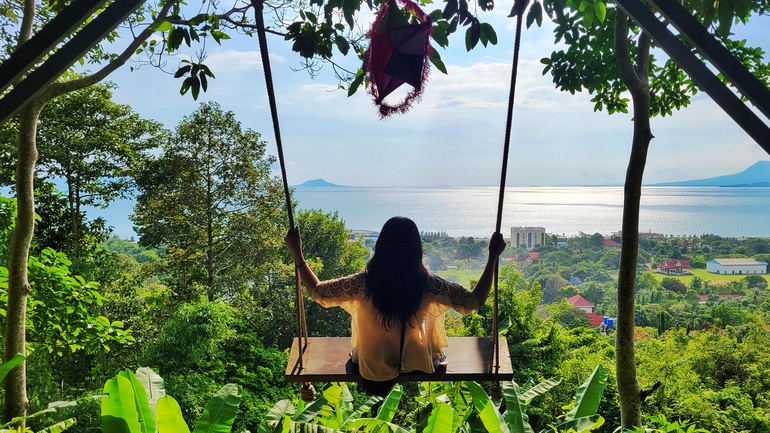
Visiting Meteora in Greece: Monasteries, Hiking Trails, and Tips

- Share
Explore Meteora with this ultimate guide covering its cliff-top monasteries, hiking trails, top things to do, and the best restaurants for a perfect stay!
Located in the heart of Greece, Meteora is famous for its monasteries perched on massive rock formations, offering panoramic views of the surrounding mountains. As a UNESCO World Heritage Site, it's a must-visit destination for outdoor enthusiasts and history lovers alike.
During my 3-month road trip through the Balkans, Meteora stood out as one of the most unforgettable highlights, with its breathtaking landscapes. In this guide, I'll share everything you need to know to make the most of your stay in Kastraki or Kalambaka and easily explore the monasteries!
The 6 Monasteries to Visit in Meteora
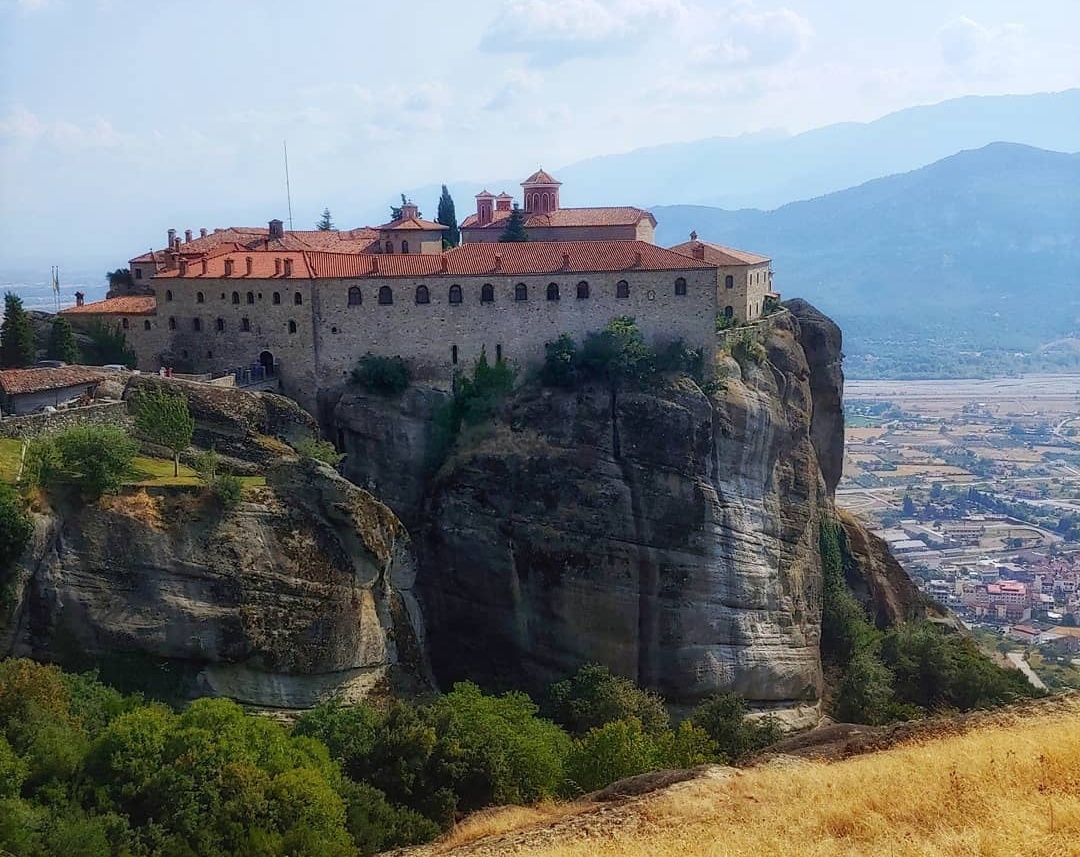 View of the Agios Stephanos Monastery, perched since the 12th century © Maxime Boudrias
View of the Agios Stephanos Monastery, perched since the 12th century © Maxime Boudrias
True gems of Byzantine architecture and spirituality set against a breathtaking backdrop, here are the six active monasteries you can visit in Meteora:
- Megalo Meteoro (Great Meteoron Monastery): The largest and oldest monastery, majestically perched on a cliff, offering incredible views of the region.
- Moni Varlaam (Varlaam Monastery): Founded in the 14th century, this monastery is renowned for its impressive frescoes and peaceful atmosphere.
- Moni Roussanou (Roussanou Monastery): A charming monastery surrounded by lush greenery, perfect for a serene visit.
- Moni Agiou Stefanou (St. Stephen's Monastery): Easily accessible, this monastery overlooks the valley and serves as a tranquil place for reflection.
- Moni Agias Triados (Holy Trinity Monastery): The most difficult to reach, but the panoramic view is worth the effort. It's also famous for its appearance in a James Bond film.
- Moni Agiou Nikolaou Anapafsa (St. Nicholas Anapafsas Monastery): The first monastery on the route to Meteora, making it an ideal starting point for your exploration.
What to Wear When Visiting Meteora: Dress Code for Monasteries
To respect tradition and ensure a pleasant visit, make sure to cover your shoulders and knees. Bring a shawl or scarf, especially during the warmer months.
When is the Best Time to Visit the Monasteries of Meteora?
The best months to visit are May, June, and September, as they allow you to enjoy the beauty of the monasteries without the crowds. While July and August are busier, they offer a lively and sunny atmosphere. From October to April, you can appreciate the peacefulness of the area, though some tourist services may be closed.
My tip: Arrive early in the morning to enjoy the cool air and a more relaxed ambiance. The early hours also provide perfect lighting for your photos.
Meteora Monasteries Opening Hours and Entrance Fees
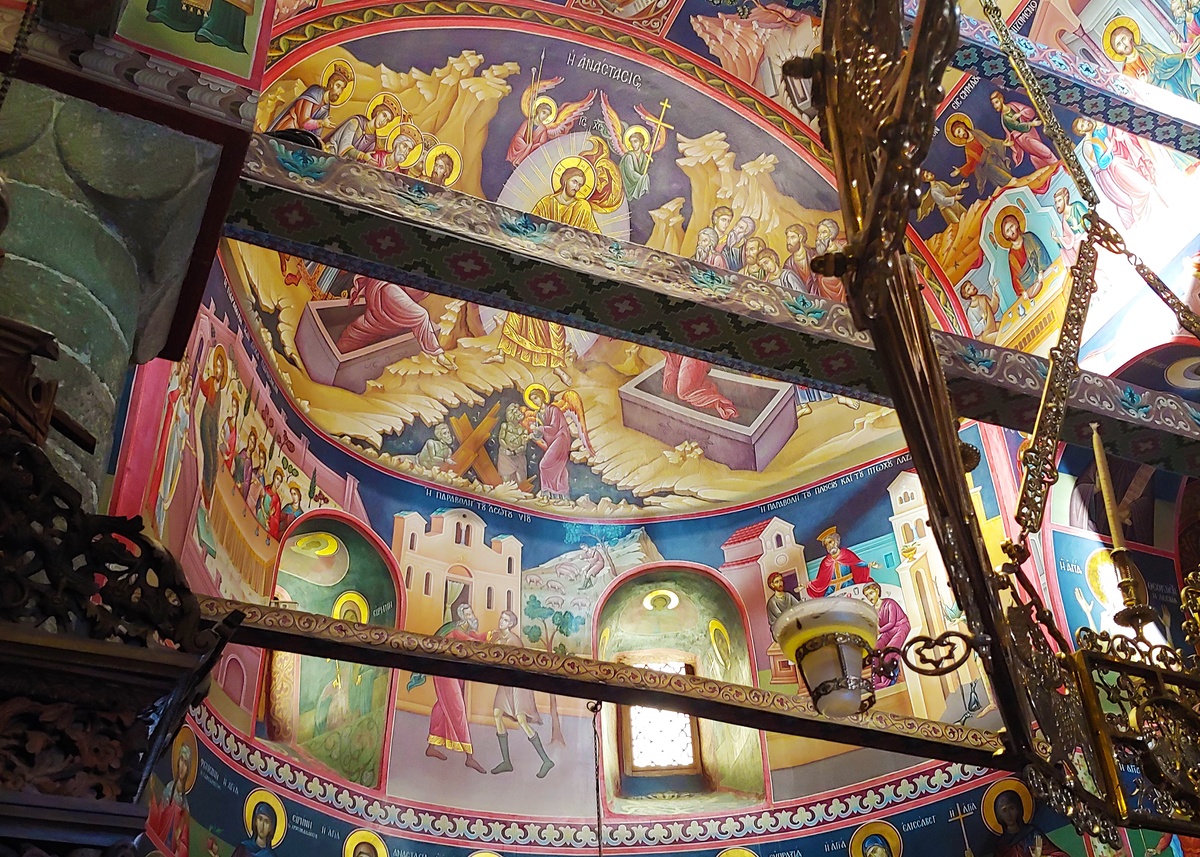 Interior view of the Saint Stephen Monastery, showcasing its architecture and spiritual ambiance © Maxime Boudrias
Interior view of the Saint Stephen Monastery, showcasing its architecture and spiritual ambiance © Maxime Boudrias
Generally, the monasteries are open from 9:00 AM to 4:00 PM, though a few may close earlier or later. Some monasteries might be closed on specific days of the week, and hours can vary between the summer and winter seasons. Be sure to check the latest hours with your hotel, but rest assured, you'll always have the chance to visit several of them.
The entrance fee for each monastery is €3. Even if you don't go inside, you can still admire these architectural marvels from the outside for free while enjoying the stunning panoramic views.
Map of Meteora Monasteries near Kalambaka and Kastraki
Here's an overview of the locations mentioned in this guide. Click on the markers for more details.
How to Get to Meteora Monasteries on Foot or by Bike: Hiking Trails and Routes Near Kalambaka and Kastraki
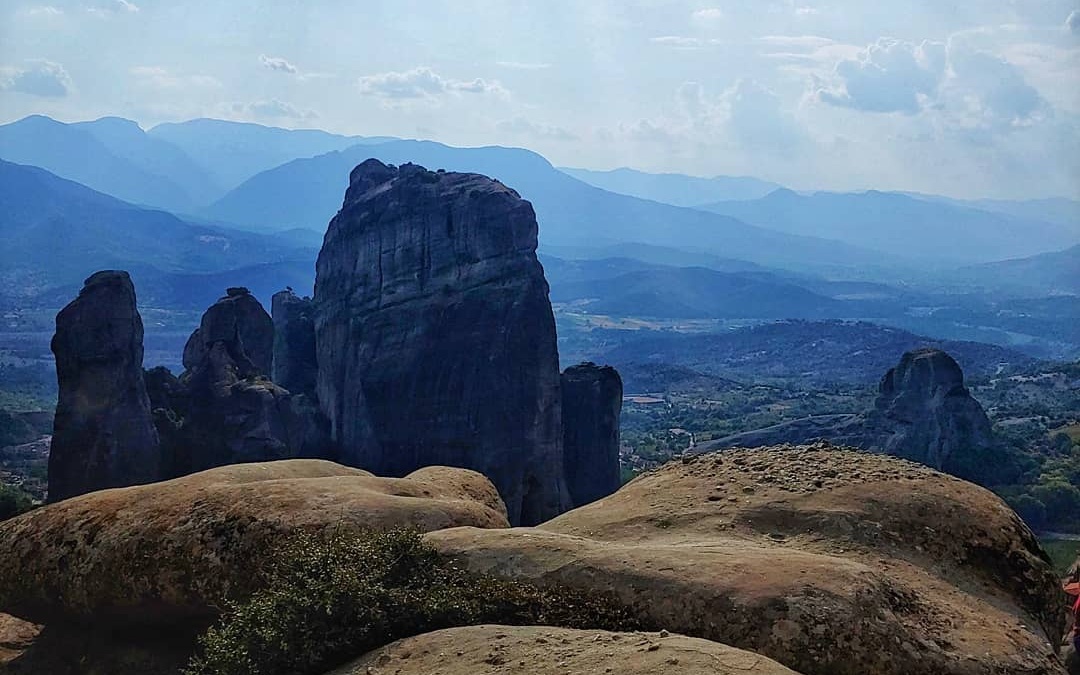 At the top of Meteora, from the Roussanou Monastery viewpoint © Maxime Boudrias
At the top of Meteora, from the Roussanou Monastery viewpoint © Maxime Boudrias
Meteora is a paradise for outdoor enthusiasts. Whether you enjoy hiking, biking, or even rock climbing, you'll find plenty of options to explore the area. Visiting the monasteries can typically be done in one to two days, with hikes ranging from 2 to 4 hours. These trails, accessible from Kalambaka or Kastraki, cater to all skill levels and offer breathtaking views of the rock formations and cliff-top monasteries.
You can also rent bikes or hire a local guide to show you the most scenic routes. If you prefer exploring on your own, local hotels provide detailed trail maps to help you plan your hike independently.
For an easier way to visit Meteora's monasteries, I recommend taking the 9:00 AM bus to Varlaam Monastery. From there, you can walk between the other monasteries and catch the return bus from St. Stephen's Monastery at 4:00 PM.
Visiting the Meteora Monasteries by Car
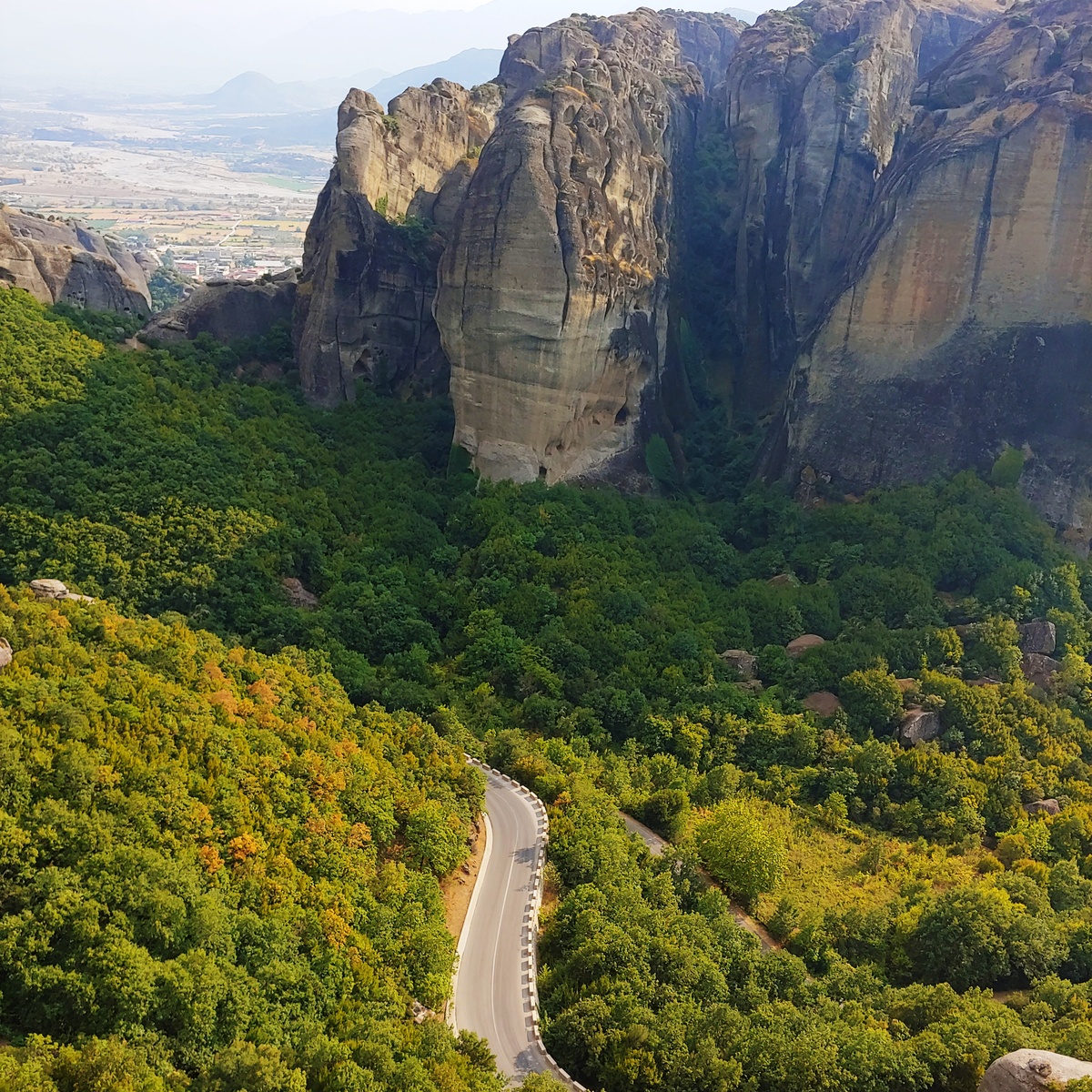 The winding roads of Meteora, crossing grand landscapes © Maxime Boudrias
The winding roads of Meteora, crossing grand landscapes © Maxime Boudrias
Each monastery has its own free parking, and the distances between them are quite short. This is the easiest and most enjoyable way to explore the area.
You'll have the freedom to stop as often as you like at the stunning viewpoints, and you can also catch the sunset from the peaks, something the buses don't allow for.
How to Get to Meteora by Train from Thessaloniki or Athens
From Thessaloniki, head to the New Railway Station (Neos Sidirodromikos Stathmos). You can get there by taxi or by taking a bus from Thessaloniki International Airport. The train ride to Kalambaka, the town at the base of Meteora, takes around 3 hours and offers beautiful views of the Greek countryside.
From Athens, catch a train at Larissa Station, the capital's main train station. The journey takes about 5 hours to Kalambaka, where you can begin exploring Meteora.
Where to Eat Near Meteora?
 My delicious and comforting traditional Greek moussaka with meat and eggplant © Maxime Boudrias
My delicious and comforting traditional Greek moussaka with meat and eggplant © Maxime Boudrias
Greek cuisine is so much more than just souvlaki and tzatziki! Don't leave without trying traditional mezze or the famous moussaka. For dessert, go for galaktoboureko, a delicious local pastry filled with creamy lemon custard.
Among my favorites, here are the best restaurants near Meteora:
In Kalambaka
- Meteora Restaurant: Enjoy stunning views while savoring traditional Greek dishes.
- Taverna Gardenia: A must-visit spot for grilled meats and savory dishes.
- Panellinio: Perfect for vegetarians, offering a wide variety of flavorful options.
In Kastraki
- Taverna Paradisos: Local cuisine served in a warm and friendly atmosphere.
- To Kanoni: Discover authentic Greek specialties in a unique taverna setting.
Where to Stay Near Meteora?
Whether you're traveling on a budget or seeking more comfort, there are options for all types of travelers in Kalambaka and Kastraki.
Here are the best places to stay in Meteora:
Budget (Backpackers)
- The Holy Rock Hostel (Kalambaka): From €15/night.
- Meteora Central Hostel (Kalambaka): From €19/night.
Comfort
- Spartacus House (Kastraki): From €30/night.
- Zoras Rooms (Kastraki): From €40/night.
High-End
- Divani Meteora Hotel (Kalambaka): From €120/night.
- Dellas Boutique Hotel (Kastraki): From €80/night.
Why Visit Meteora in Greece?
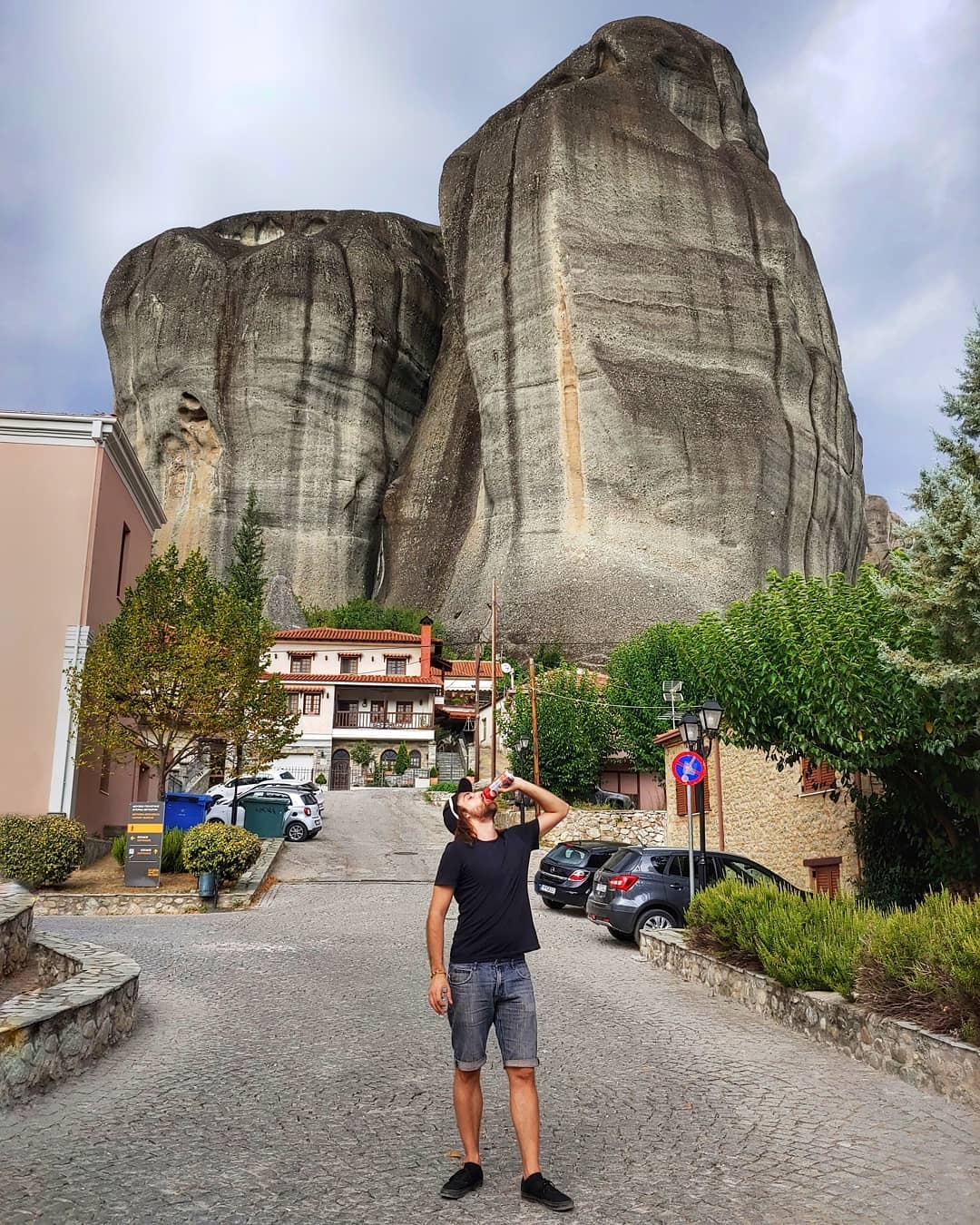 After visiting this Greek gem, nothing beats a local beer in the streets of Kastraki! © Maxime Boudrias
After visiting this Greek gem, nothing beats a local beer in the streets of Kastraki! © Maxime Boudrias
Meteora is a unique destination where nature meets history. From hiking trails and exploring cliff-top monasteries to indulging in rich local cuisine, this is a trip you won't soon forget.
Ready to go? Meteora is waiting to offer you a one-of-a-kind travel experience!
FAQs
What are the must-see attractions in Greece?
Greece, with its rich historical heritage and breathtaking landscapes, offers a multitude of wonderful sites to explore. Here are some popular attractions to include in your itinerary:
- Acropolis of Athens: This iconic symbol of ancient Greece is a must-visit. The Parthenon, dedicated to the goddess Athena, showcases the architectural ingenuity of the Greeks.
- Ancient Site of Delphi: Once a sanctuary of Apollo, Delphi was the site of the famous oracle in ancient times. This UNESCO World Heritage site provides stunning views of the surrounding valley.
- Sanctuary of Olympia: Famous for hosting the first Olympic Games, this site houses the ruins of the Temple of Zeus and other ancient structures, perfect for history enthusiasts.
- Monasteries of Meteora: Perched on impressive rock formations, these monasteries are not only a place of spirituality but also a breathtaking natural spectacle. The panoramic views of the surrounding valley are simply incredible. Check out our detailed guide on Meteora to explore the monasteries and the best outdoor activities in the area.
- Cyclades Islands: Don't miss the stunning islands like Santorini and Mykonos, known for their whitewashed houses, sandy beaches, and vibrant nightlife. It's the perfect place to relax after your cultural explorations.
When planning your trip, be sure to balance culture, history, relaxation, and outdoor adventures. Greece has so much to offer, and each region has its own magic waiting to be discovered!
What are the visa requirements for tourists visiting Greece?
The visa requirements for visiting Greece depend on your nationality and the length of your stay. If you're a citizen of the European Union, the European Economic Area (EEA), or Switzerland, you won't need a visa for a stay of less than 90 days. For travelers from the United States, Canada, Australia, or New Zealand, no visa is required for short stays either.
However, if you're planning to stay for more than 90 days or have specific plans such as work or study, you may need to apply for a visa. It's always a good idea to check the requirements for your nationality beforehand.
Also, make sure your passport was issued within the last 10 years and that it's valid for at least 3 months beyond your intended departure date. Keep in mind that if you're traveling within the Schengen Area, which includes Greece, you're limited to a 90-day stay within a 180-day period without a visa.
Speaking of traveling in Greece, if you're looking for a unique experience, be sure to explore the monasteries of Meteora in our detailed guide. Whether you're into hiking or history, you won't be disappointed by the beauty of this incredible site!
What is the currency and how to pay in Greece?
In Greece, the official currency is the euro (EUR). If you are coming from a Eurozone country, you won't need to exchange currency and can easily pay in cash.
Paying by Card in Greece
Credit and debit cards are widely accepted, especially in hotels, restaurants, and shops in larger cities like Athens and Thessaloniki, as well as popular tourist areas.
That said, it's always handy to carry some cash with you, particularly if you plan to visit smaller islands, local markets, or rural villages where card payments may not be as common. ATMs can also be hard to find in remote areas.
How to Withdraw Cash in Greece Without Fees
Before you go, check with your bank about any fees for international transactions. Some financial institutions offer cards with no foreign transaction fees for payments and cash withdrawals, which can help you save money. Also, try to avoid exchanging money at airports, where rates tend to be less favorable than in the cities or tourist areas.
Enjoy your trip! And if you're looking to visit a truly unique place filled with history and stunning views in Greece, make sure to check out our detailled guide on the Meteora monasteries.
Disclosure: Some links on this page are affiliate links. This means that at no extra cost to you, we may earn a commission if you make a purchase. We only recommend products and services we trust and believe will add value to your travels.


